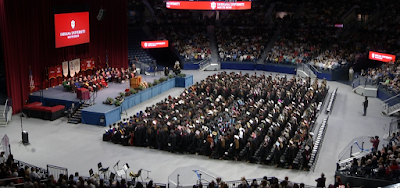Congratulations to all of our graduates and award winners. We are a quarter of a way into this century and it seems bizarre to this [old] blog writer that most of these students have no experience of the 1900s. This is the next generation that will determine the future of both humanity and the world. Out with the old and in with the new! It has been a rough year for many students - whether transitioning from high school to college, overcoming health issues, holding a part-time job, or shouldering family responsibilities while studying. You all are amazing for succeeding under these challenging conditions. We hope you'll have an enjoyable summer, whether relaxing or seeking adventure.
Hannah Gregor
Joseph H. Ross Award for Outstanding Oral Presentations
Zahra Aljuboori
Gretchen Anderson Pathways Scholarship
Alissa Sonnenberg
Jared Chapin
Mackenzie Reasor
Carolyn & Lawrence Garber Summer Research Scholarship
Kristen Miller
Kristen Miller
*This award is made possible by donors to the IU South Bend Chemistry Department Fund.






